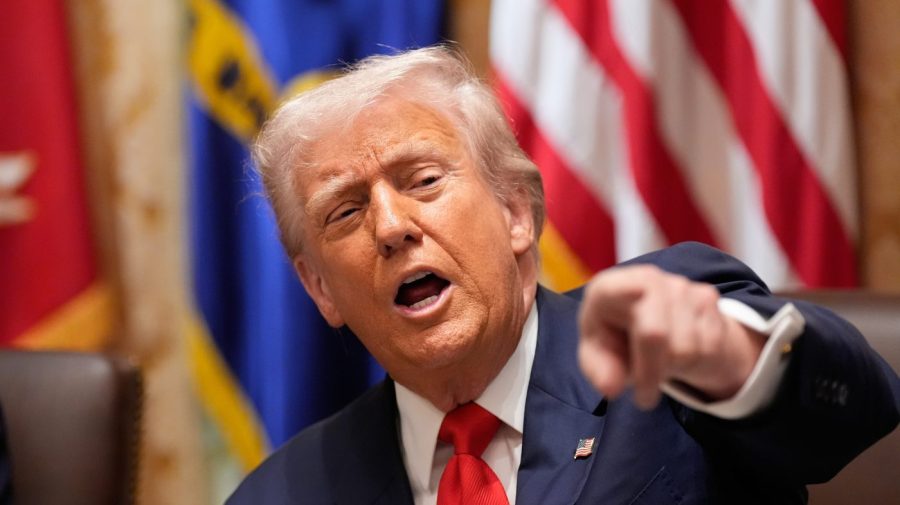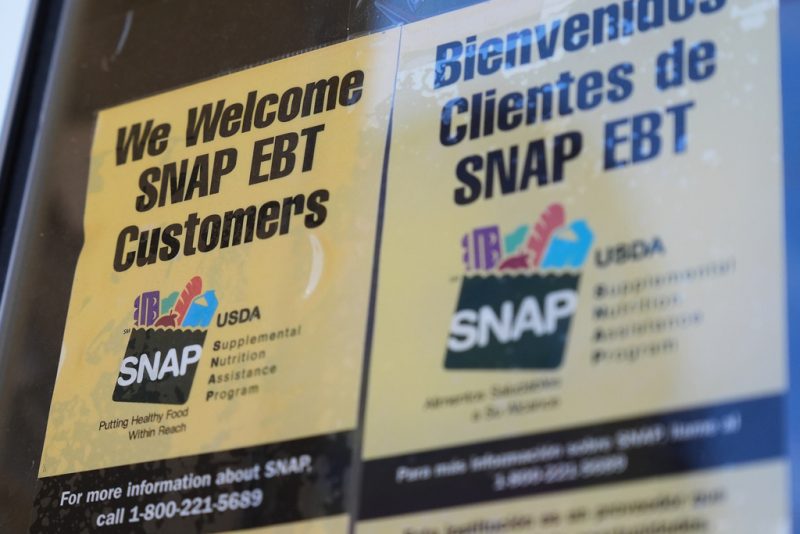
High-profile defendants in a range of cases brought by President Trump’s Justice Department are pulling from the same playbook.
From the president’s list of personal foes to perfect strangers caught in the crosshairs of his policy agenda, two separate but related defenses are popping up on everyone’s docket: Selective and vindictive prosecution.
The legal claims are tough to prove. But as Trump wields DOJ’s power with a tighter grip than past modern presidents, defendants are betting that judges will take their sides and throw out the cases altogether.
On Monday, former FBI director James Comey urged the federal judge overseeing his criminal case to dismiss the charges with prejudice, meaning they could not be brought again, because of the government’s conduct.
“The circumstances of the charging decision in this case — a last-minute retaliatory charge after a torrent of personal invective by a President who expressly sought charges regardless of the facts — warrant dismissal with prejudice on both vindictive and selective prosecution grounds,” the motion reads.
Comey contends that Trump directed his prosecution on false statements and obstruction charges, stemming from 2020 testimony he gave Congress, out of “personal spite” and in retaliation for Comey’s public criticisms of the president.
He attached to his motion 60 pages of back-and-forth between the two foes in the media and online, spanning nearly a decade, as proof of the deep-rooted rivalry.
The former FBI director also alleges that Trump’s installation of a hand-picked U.S. attorney, Lindsey Halligan, to bring the charges just days before the statute of limitations ran out bolsters his claim.
Comey is hardly the only defendant to accuse Trump’s DOJ of selective and vindictive prosecutions.
Lawyers for Rep. LaMonica McIver (D-N.J.), who is accused of assaulting and interfering with immigration officers at a New Jersey detention center during a congressional oversight visit, wrote in a similar bid to dismiss her charges that the prosecution is “premised on punishing a Democratic official for her disfavored policy views.”
McIver takes aim at the prosecutor who brought the case, as well, noting that then-interim U.S. Attorney Alina Habba said after her appointment “we could turn New Jersey red” and hoped to “help that cause” in her role.
The argument has also come up in the case of Kilmar Abrego Garcia, the man mistakenly deported to El Salvador, who is now back in the United States and facing human smuggling charges in Tennessee.
Abrego Garcia says he was only charged as punishment for challenging his mistaken deportation and to shift public opinion of his case. The Justice Department has used the indictment to bolster accusations Abrego Garcia is an MS-13 gang member, which he denies.
But unlike Comey and McIver, Abrego Garcia doesn’t lump the U.S. attorney that brought his charges with those he says targeted him.
“Even if others in the Executive Branch have alleged ill will towards the defendant, there is nothing before the Court to establish that such alleged ill will actually motivated the prosecution team to bring the charges and not a desire to hold human smugglers accountable for their serious criminal conduct,” DOJ said in court filings.
Earlier this month, a federal judge in Tennessee ruled Abrego Garcia had shown a realistic likelihood his motion will succeed, entitling him to obtain evidence from the government and a hearing, scheduled for Nov. 4 and 5.
Other high-profile defendants could bring similar motions soon. Both New York Attorney General Letitia James (D) and former national security adviser John Bolton, two other Trump adversaries recently charged, alluded to targeting by Trump’s Justice Department in statements following their indictments.
And while most defendants seeking to toss their charges over selective and vindictive prosecutions have become the object of national focus for their run-ins with Trump, some lesser-known defendants are also trying their hand.
Sean Charles Dunn, a former DOJ employee, was unwittingly transformed into an opposition symbol of Trump’s local crime crackdown when he allegedly slung a sandwich at a federal officer in Washington, D.C.
Federal prosecutors sought to hit him with a felony assault charge but failed to obtain an indictment, so the charge was dropped to a misdemeanor.
Nonetheless, DOJ officials branded him as part of the “deep state” and joked about where to “stick [his] Subway sandwich.” Though he offered to surrender voluntarily, law enforcement raided his apartment and posted the video online to movie-like soundtrack, his lawyer wrote in the motion.
“The federal government has chosen to bring a criminal case over conduct so minor it would be comical — were it not for the unmistakable retaliatory motive behind it and the resulting risk to Mr. Dunn,” the motion read.
Selective and vindictive prosecution claims are exceedingly uncommon and face a high bar.
As the Supreme Court has put it, “in our criminal justice system, the Government retains ‘broad discretion’ as to whom to prosecute.”
To prevail in a selective prosecution claim, defendants must show they were unfairly singled out for prosecution, where others similarly situated have not been. They must also prove that the government’s selection was based on an unlawful reason like race, religion or a person’s constitutionally protected conduct.
In vindictive prosecution claims, they must show that prosecutors harbored “genuine animus” toward them and that they would not have been prosecuted except for that.
But each of the defendants say their circumstances fit the bill.
Comey’s lawyers wrote “this is thus the rare case.” McIver’s attorneys called hers a “rare case,” too. Abrego Garcia’s lawyers said that “if there has ever been a case for dismissal on those grounds, this is that case.” And Dunn’s attorney said that, “although the government ‘rarely flatly admits’” to engaging in discrimination, “it appears to have done so here.”
If the motions fail, get ready for some trials.
Dunn goes to trial on Nov. 3, and McIver on Nov. 10. Comey and Abrego Garcia both head to face juries in January.
Welcome to The Gavel, The Hill’s weekly courts newsletter from Ella Lee and Zach Schonfeld. Reach out to us on X (@ByEllaLee, @ZachASchonfeld) or Signal (elee.03, zachschonfeld.48). Sign up here or in the box below:
IN FOCUS
Who’s who: Trump foe prosecution short-list
The recent indictments of Comey, James and Bolton raise the question of what prominent Trump foe may be charged next.
Speaking in the Oval Office last week alongside Attorney General Pam Bondi and FBI Director Kash Patel, Trump listed off a series of people he said should be investigated.
“I hope they’re looking at political crime, because there’s never been so much political crime against a political opponent as what I had to go through,” Trump said.
Sen. Adam Schiff (D-Calif.): In the Oval, Trump explicitly said “I hope they’re looking at” Schiff, who served as the lead manager on Trump’s first impeachment and was a member of the House Jan. 6 committee. Trump has repeatedly suggested he wrongly obtained more favorable lending conditions for his Washington-area home, a claim the lawmaker denies. NBC News reported in August that Bondi appointed a special attorney to investigate Schiff, who has since created a legal defense fund.
Lisa Cook, Federal Reserve governor: Trump, who has criticized the Fed for not lowering interest rates faster, attempted to fire Cook in August. Trump claims she committed mortgage fraud by designating two properties as primary residences to receive lower rates. Cook’s lawsuit is now before the Supreme Court, which will hear oral arguments in January as to whether Trump had valid cause to fire her. Meanwhile, the Justice Department received a criminal referral from the Federal Housing Finance Agency director and has reportedly opened an investigation.
John Brennan, former CIA director: On Tuesday, House Judiciary Chair Jim Jordan (R-Ohio) criminally referred Brennan to the Justice Department over accusations he intentionally made false statements to the committee during a 2023 interview. Jordan claims Brennan falsely denied the CIA relied on the discredited Steele dossier to draft an intelligence community assessment following the 2016 election.
Christopher Wray, former director & FBI officials under him: Trump promoted a right-wing outlet’s story on Truth Social that claimed the FBI placed undercover agents at the Capitol on Jan. 6, a finding that the Office of the Inspector General has disputed in a 2024 report. The president wrote that Wray has “some major explaining to do” and suggested he was “caught LYING” like Comey, whom his DOJ has charged over 2020 testimony before Congress. In an exclusive interview with NBC News in September, Trump said he “would certainly imagine” DOJ is investigating Wray.
Fani T. Willis, Fulton County, Ga., district attorney: Willis brought the fourth criminal indictment against Trump, which accused him of entering an monthslong, unlawful conspiracy to subvert Biden’s 2020 win in Georgia. Willis was disqualified over her romance with a top prosecutor. The New York Times reported Monday that the Justice Department sent a subpoena scrutinizing a trip Willis took to the Bahamas with colleagues last year. It remains unclear if Willis is the target of the investigation, but Trump last month said Willis and other prosecutors are “CRIMINALS who will hopefully pay serious consequences for their illegal actions.”
Jack Smith, former special counsel: In some of his first public remarks since bringing two now-dismissed criminal cases against Trump, Smith last week denied the investigations were politically motivated. Trump has long called for Smith to face punishment, and after the interview, Trump said “deranged Jack Smith in my opinion is a criminal.” The Office of Special Counsel, which is different than Smith’s previous office, has also said it is investigating him for potentially violating the Hatch Act, though that wouldn’t amount to criminal charges.
Andrew Weissmann, former FBI counsel: Weissman played a lead role on former special counsel Robert Mueller’s team that investigated alleged links between Russia and the 2016 Trump campaign. He has been in Trump’s crosshairs ever since and frequently criticizes the president as a legal analyst on MSNBC. Trump’s executive order targeting Jenner & Block cited in part the law firm’s rehiring of Weismann after the Mueller investigation concluded. Just after mentioning Smith last week, Trump said “I hope they’re going to look into Weissman too.”
Lisa Monaco, former Deputy AG: And just after mentioning Weissman, Trump noted he “had somebody named Lisa who was his puppet worked in his office. And I think she should be looked at very strongly.” Trump appeared to be referring to Lisa Monaco, who went on to serve as Attorney General Merrick Garland’s No. 2. Trump has blamed her for the Justice Department’s criminal investigations into him. Monaco is now Microsoft’s head of global affairs, and Trump issued a lengthy Truth Social post last month calling on Microsoft to fire her.
How George Santos got Trump’s help
When Trump announced Friday night his decision to commute former Rep. George Santos’s (R-N.Y.) fraud sentence, he left little doubt about his reasoning.
“George Santos was somewhat of a ‘rogue,’ but there are many rogues throughout our Country that aren’t forced to serve seven years in prison,” Trump wrote in a winding Truth Social post, which compared Santos’s fabulist tendencies to Sen. Richard Blumenthal’s (D-Conn.) misstatements about his service — or lack of — in the Vietnam War.
“This is far worse than what George Santos did,” the president continued, “and at least Santos had the Courage, Conviction, and Intelligence to ALWAYS VOTE REPUBLICAN!”
Trump’s explicit reference to Santos’s politics lends insight into the president’s decision-making when it comes to clemency.
Across his two presidencies, so far, Trump has now granted clemency to at least 15 Republican politicians, including several former members of Congress.
Trump also issued pardons to nearly all 1,500 defendants charged in connection with the Jan. 6, 2021, Capitol attack, and commuted the sentences of the others — a handful of extremist group leaders convicted of plotting to stop the certification of the 2020 presidential election so Trump could stay in power after he lost.
Santos was released from prison late Friday night shortly after Trump’s announcement, serving 84 days of his more than seven-year sentence. The New York Republican pleaded guilty to wire fraud and aggravated identity theft last year.
His criminal scrutiny came as Santos’s colleagues expelled him from the House upon a damning ethics report that levied allegations he improperly used campaign funds on luxury goods and reported fictitious personal loans to his campaign.
The disgraced former congressman had long brushed off the idea of him seeking help from Trump. Asked by The Hill in 2023 about the possibility of a pardon, Santos retorted: “Why is that little brain of yours going there?”
Even after Santos pleaded guilty — and through Trump’s reelection, which he vocally supported — Santos insisted he would not seek clemency.
“I don’t intend on having that conversation,” Santos told reporters when asked about requesting a pardon.
However, the dynamic shifted after a judge handed down an 87-month prison sentence in February. As Santos’s prison report date approached, he began his pleas to Trump.
“I’ll take a commutation, clemency, whatever the president is willing to give me,” Santos told British media personality Piers Morgan in May.
With no intervention from the White House, Santos reported to FCI Fairton, a federal correctional facility in New Jersey, in July. He penned regular online columns from behind bars, criticizing the conditions at the facility. And after he was put in solitary confinement, his pleas to Trump became more direct.
On Monday, Santos’s latest column appeared. The headline read, “Santos in Solitary: A passionate plea to President Trump.”
“A lifelong Republican and a proud believer in your America First vision, I never wavered,” Santos wrote.
Trump announced the commutation four days later.
Though Santos’s commitment to Trump’s political vision was lauded by the president himself, Trump’s allies spurned reporters who drew the connection.
Former White House spokesman Harrison Fields posted an image captioned, “ABC: Why does Trump only pardon Republicans?” alongside an image of former Illinois Gov. Rod Blagojevich, a Democrat Trump pardoned earlier this year after commuting his sentence during his first term.
Well, a Democrat, of sorts. Blagojevich has described himself as a “Trumpocrat” since the president commuted his sentence.
Other Democrats have sought Trump’s favor, with varying levels of success.
New York City Mayor Eric Adams (D) cozied up with Trump in the months before his bribery trial was slated to begin, meeting with the president days before he was sworn in for his second term. Trump’s Justice Department ultimately dismissed the case.
But ex-Sen. Bob Menendez (D-N.J.), former chair of the powerful Senate Foreign Relations Committee, was forced to report to prison in June after he was convicted of accepting lavish bribes in exchange for his political clout — despite his reported efforts to seek clemency from Trump and public attempts to curry favor.
As Santos prepared for his release, we asked his attorney, Joe Murray, for his initial reaction. He texted us the American flag emoji and called Trump the greatest president in U.S. history.
“God has answered our prayers,” Murray told The Gavel.
Trump’s commutation has been met with criticism from Democrats and even some of Santos’s fellow New York Republicans. Still, many Republicans are standing behind the president’s decision.
While appearing on the Sunday show circuit, Speaker Mike Johnson (R-La.) said he didn’t think being a Republican was a factor in Santos’s clemency. He told ABC’s “This Week” he instead believes Trump’s message was a reference to Santos’s past.
The GOP leader turned the focus to former President Biden’s flurry of pardons, which included preemptive pardons for members of his family, Jan. 6 House committee members and former chief White House medical adviser Anthony Fauci, who were targets of Republicans.
“At least he’s open and transparent about it,” Johnson said of Trump. “Joe Biden never told us anything.”
A reporter’s eyebrow-raising chat with Lindsey Halligan
The legal world erupted Monday night when our legal press corps colleague at Lawfare, Anna Bower, published a Signal conversation interim U.S. Attorney Lindsey Halligan initiated with her this month.
Halligan, a former White House aide tapped by Trump to fill the position last month, reached out to criticize Bower’s tweets about the prosecution of James, which she oversees.
That’s weird enough, as is. But it got weirder.
James is charged over mortgage fraud allegations stemming from her purchase of a home in Norfolk, Va. Prosecutors claim she lied about her plans for the property, renting it instead of using it as a secondary residence, which allowed her to obtain favorable loan terms.
Bower’s tweets didn’t reference her own reporting; they referenced a New York Times report that the Norfolk home in question was occupied by James’s great-niece, with the New York attorney general spending extended stays there several times a year.
The Times reported that James’s niece testified to a grand jury in Norfolk that she had lived in the house for years and did not pay rent. However, she was not asked to testify again, and the grand jury that ultimately voted to indict James was seated in Alexandria, not Norfolk, according to the report.
In her tweet, Bower suggested the information in the report was “important exculpatory evidence” because of the indictment’s allegations she sought a “second home” mortgage while intending to use it as an investment rental property.
“You’re assuming exculpatory evidence without knowing what you’re talking about,” Halligan wrote to the reporter. “It’s just bizarre to me. If you have any questions, before you report, feel free to reach out to me. But jumping to conclusions does your credibility no good.”
Halligan said the Times’s report was “disclosing grand jury info” that was “not a full representation of what happened.”
Bower repeatedly said she would issue a correction if Halligan could provide details about what the report got wrong.
“I can’t tell you grand jury stuff,” Halligan wrote in one message.
“You’re biased. Your reporting isn’t accurate. I’m the one handling the case and I’m telling you that,” she wrote in another. “If you want to twist and torture the facts to fit your narrative, there’s nothing | can do. Waste to even give you a heads up.”
Bower posted the full conversation that followed here.
Only at the end did Halligan ask for it to be off the record. It was too late. As public officials widely know, conversations with reporters are on the record by default unless the reporter agrees otherwise beforehand.
Halligan, for her part, has a politics and broadcast journalism degree from Regis University.
She pointed to the “disappearing messages” feature she activated on Signal, an encrypted messaging app, as reason it should have been clear her comments were intended to be off the record. She was also surprised to learn that Bower planned to write a story.
“What is your story?” Halligan wrote. “You never even told me about a story.”
We reached out to Halligan for comment, and to James’s counsel.
But beyond the on-or-off-the-record debacle, it also thrusts into the spotlight the rules surrounding grand jury secrecy.
Federal rules prevent most people in the room from disclosing grand jury proceedings: grand jurors themselves, interpreters, court reporters, others who assist in recording or transcribing the proceedings and prosecutors.
So, while witnesses who testify before the grand jury and their attorneys can speak out, the ban does apply to Halligan.
If you ever have news tips to share, we’ll happily accept Signal messages. Just be sure to tell us in advance whether you want to be kept anonymous. Contact us at elee.03 or zachschonfeld.48.
SIDEBAR
5 top docket updates
- Bolton pleads not guilty: Former national security adviser John Bolton pleaded not guilty to 18 criminal counts alleging he mishandled classified materials.
- National Guard fight goes to SCOTUS: The Trump administration asked the Supreme Court to let it deploy the National Guard to the Chicago area amid President Trump’s push to send military troops into Democratic-led cities, the first time the issue has reached the justices.
- Justices weigh Voting Rights Act limits: During oral arguments over Louisiana’s congressional map, the Supreme Court leaned toward restricting the use of race in redistricting. It could curtail a central provision of the Voting Rights Act.
- Shutdown layoffs temporarily blocked: A federal judge sided with government employee unions in temporarily barring the Trump administration from carrying out reductions in force (RIFs) expected to impact more than 4,000 workers amid the shutdown.
- Habba’s U.S. attorney fight: The Trump administration defended Alina Habba’s installation as New Jersey’s top federal prosecutor before a skeptical federal appeals panel Monday.
In other news
- A-Bove and beyond: Emil Bove, Trump’s former defense attorney-turned-federal appeals court judge, pushed for judicial deference to the executive branch in one of his first opinions on the bench.
- Keeping distance: A transgender student in South Carolina dropped his appeal in a lawsuit over using the school bathroom aligned with his gender identity after switching to virtual learning, the South Carolina Daily Gazette reported. Last month, the Supreme Court agreed to let him use the boys’ bathroom, rejecting the state’s request to enforce its ban against him, but only until the appeal was resolved.
- AI trial: The University of North Carolina School of Law will simulate a complete criminal trial Friday before a jury composed of ChatGPT, Grok and Anthropic. The mock trial, which imagines an AI-filled legal system in 2036, is part of the school’s Converge-Con event.
ORDER LIST
Cases the Supreme Court is taking up — or passing on — this term.
IN: Guns & drugs
The Supreme Court took up three new cases after meeting behind closed doors Friday for the justices’ last conference of the October session.
We previewed all three in last week’s edition of The Gavel.
Most significantly, the court took up its next case that will apply the 6-3 conservative majority’s expanded Second Amendment test. It requires gun control measures to be consistent with the nation’s historical tradition of firearm regulation.
In United States v. Hemani, the justices will decide whether a federal crime that prohibits anyone “who is an unlawful user of or addicted to any controlled substance” from possessing a firearm survives the new test.
It’s a regularly prosecuted charge, but some lower courts have ruled it violates defendants’ Second Amendment rights in certain instances.
The 5th U.S. Circuit Court of Appeals has gone the furthest, ruling it isn’t constitutional when the person charged with unlawful possession was sober at the time, even if they have a history of drug use.
In Flower Foods v. Brock, the Supreme Court will review an arbitration dispute involving a bakery operator and delivery drivers.
The Federal Arbitration Act (FAA) allows companies to enforce their arbitration agreements in federal court, but it exempts workers “engaged in … interstate commerce.” The justices will decide whether that exemption extends to delivery drivers who don’t cross state lines.
And in Keathley v. Buddy Ayers Construction, the justices will decide whether Thomas Keathley’s lawsuit against a construction company over an auto accident can move forward.
A lower court dismissed the suit because he didn’t disclose the claim in his pending bankruptcy case, but Keathley says it was an honest mistake so he shouldn’t be punished.
OUT: Corner crossing
The Supreme Court will not weigh in on the legality of “corner crossing,” a dispute with major implications for western landowners. A reader in Wyoming asked us about it, so we’ve got the full rundown:
Millions of acres across the American West are split into a checkerboard pattern of private and public land. Many public areas are landlocked by private property.
“Corner crossing” refers to moving diagonally from one public parcel to the next by momentarily trespassing through the adjoining private property.
The battle over whether it’s legal reached the Supreme Court after four Missouri elk hunters in 2021 corner crossed through a private ranch. The owner accused them of trespassing.
A jury acquitted them of criminal trespass, but the ranch sued the hunters for $9 million.
The ranch petitioned the high court to hear its appeal, Iron Bar Holdings v. Cape, after the 10th U.S. Circuit Court of Appeals ruled in the hunters’ favor.
By declining to take up the case without comment, it leaves in place the 10th Circuit ruling, which has a binding effect in Wyoming, Utah, Colorado, Kansas, Oklahoma and New Mexico.
ON THE DOCKET
Don’t be surprised if additional hearings are scheduled throughout the week. But here’s what we’re watching for now:
Today:
- The U.S. Court of Appeals for the 9th Circuit is set to hear oral arguments in the Trump administration’s appeal of a judge’s order blocking Trump’s federalization of the National Guard in California and ordering him to return command to Gov. Gavin Newsom (D).
Thursday:
- The U.S. Court of Appeals for the 4th Circuit is set to hear oral arguments over a group of cities and environmental groups’ challenge to the Trump administration’s freeze of Inflation Reduction Act and Infrastructure Investment and Jobs Act funds.
- A federal judge in Washington, D.C., is set to sentence Thomasz Szabo, a foreign national from Romania, for his role in a swatting conspiracy against dozens of individuals, including senior U.S. government officials.
Friday:
- New York Attorney General Letitia James (D) is set to be arraigned on charges she misrepresented her intended use of a property before a federal judge in Norfolk, Va.
- A federal judge in Washington, D.C. is set to hold a hearing to weigh the capital city’s request for a preliminary injunction barring the National Guard’s deployment throughout the city and the Trump administration’s motion to dismiss the city’s challenge.
Monday:
- The Justice Department is set to file any opposition to pretrial motions filed by Sean Charles Dunn, the man accused of slinging a sandwich at a federal officer in Washington, D.C., which turned him into an opposition symbol amid Trump’s crackdown on local crime.
Tuesday:
- A federal judge in Oregon is set to hold a pretrial conference ahead of a three-day bench trial over Trump’s efforts to call up and deploy the National Guard to Portland.
WHAT WE’RE READING
- The Wall Street Journal’s Rachel Wolfe: Utah County Prepares for Trial of Charlie Kirk Murder Suspect
- The New York Times’s Karen Zraick: The Kids Who Sued Trump Just Lost Big in Court. Or Did They?
- Bloomberg Law’s Jacqueline Thomsen and Brian Dowling: Reagan Judges Are Unrestrained Critics of Trump’s Legal Moves
- The Atlantic’s Shane Harris: The Bolton Case Is Not Like the Others
- New Jersey Globe’s Zach Blackburn: ‘68 seconds’: Judge to rule whether McIver is immune from Delaney Hall charges












